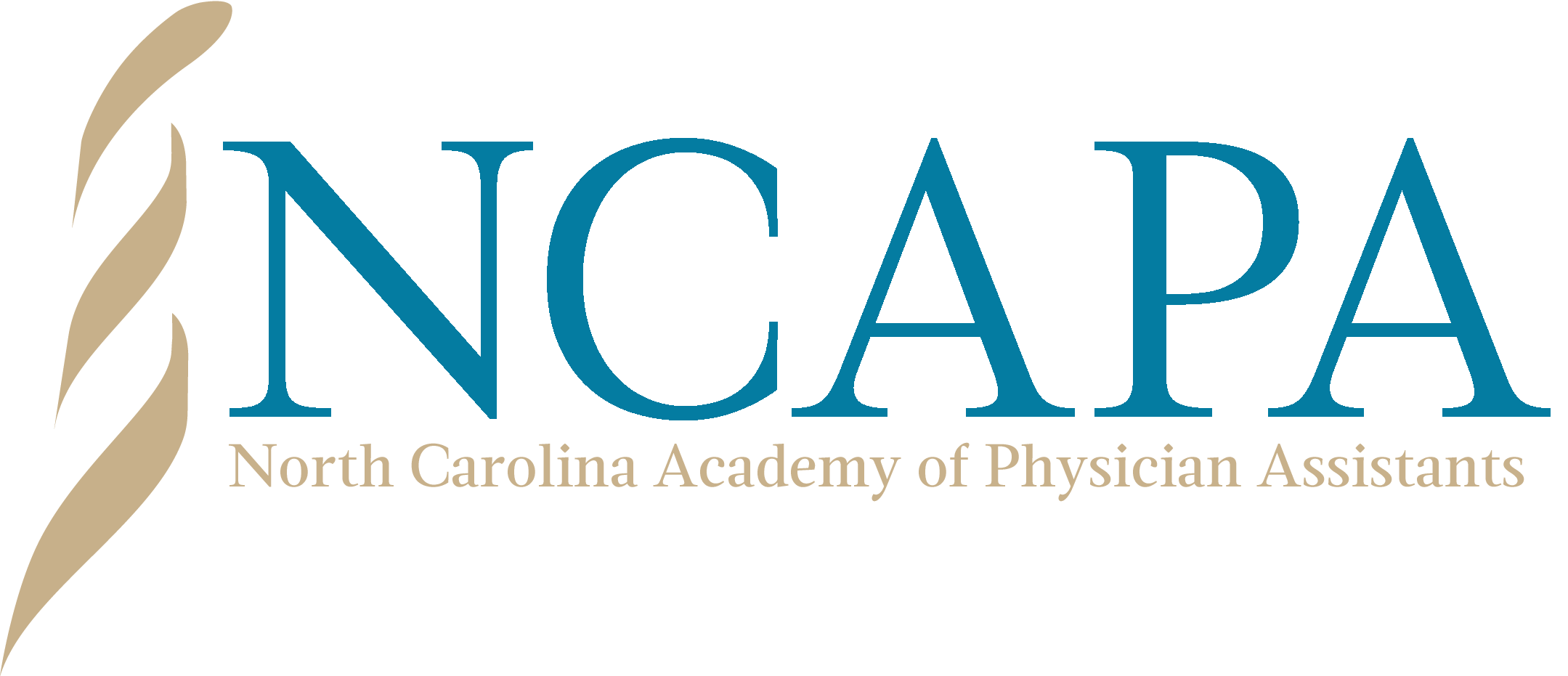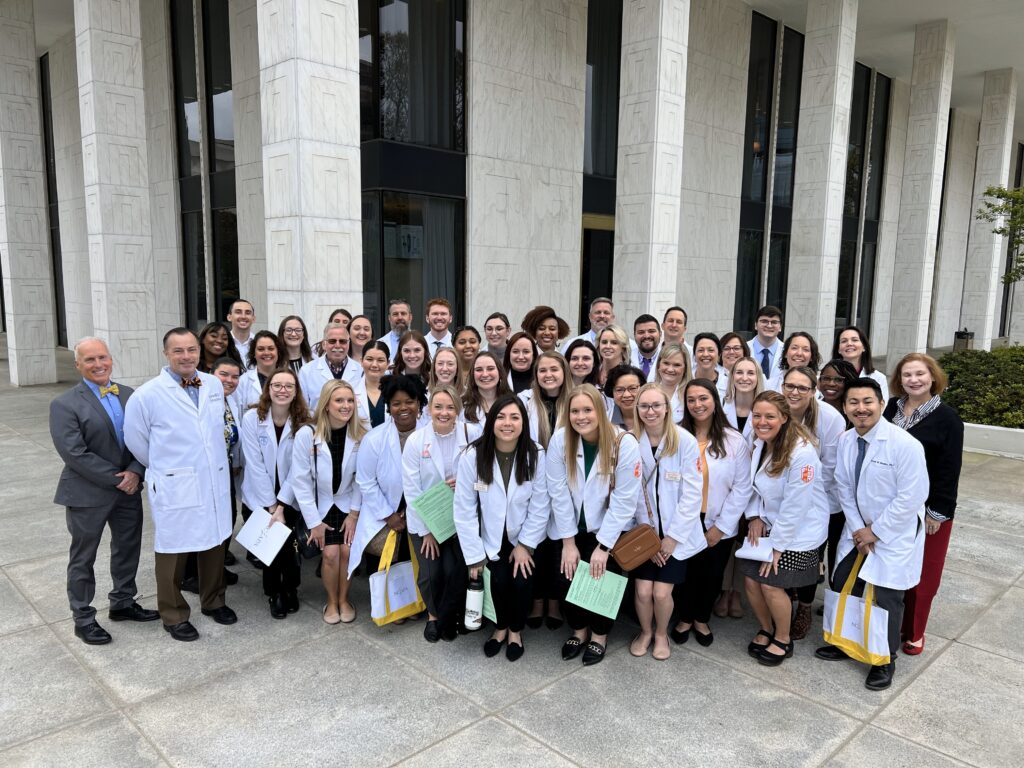Mission Statement
Strengthen the PA profession in North Carolina through advocacy, education, and support to improve healthcare for all patients.
Vision Statement
North Carolina PAs transforming patient health through equitable team-based care.
NCAPA Firsts
- First state Academy with a Medical Society that has a PA Section
- First state Academy to have PA representation in the Medical Society House of Delegates
- First state Academy to have a PA serve on the Medical Society Foundation Board
- First state Academy to have a PA serve as president of the Medical Board of Directors
- First state Academy to develop a recertification conference
- First state Academy to own a building dedicated to the PA profession: Eugene A. Stead, Jr. Center for Physician Assistants
North Carolina – The birthplace of the PA Profession
Beginning of a Healthcare Profession
In 1965, Duke University Medical Center (DUMC) established the first formal education program in the USA to educate PAs. In 50 years, the profession has grown to include over 150,000 clinically active PAs and 250 accredited educational programs, with over 8,000 new PA students enrolling annually.
1965 – Dr. Eugene A. Stead, Jr., chairman of the department of medicine at Duke University, begins the first formal academic-based program to educate PAs to work under the supervision of physicians, while helping to meet the growing demand for health care services. His first students are four former military corpsmen who, upon leaving the military, have no opportunity to use their knowledge and skills in the civilian health care sector.
1967 – First three PA students graduate from the 2-year Duke PA Program and are certified by the Medical Center on October 6th.
1968 – The first graduates and students of the Duke University PA Program organize the American Association of Physician Assistants (known today as the American Academy of Physician Assistants) in April and had the organization incorporated in North Carolina in May. Since that time the Academy has grown to represent the interest of PAs in 50 states, the District of Columbia, Guam, and the federal services comprised of the Army, Air Force, Navy, Public Health Service and Department of Veteran Affairs.
1970 – Three PA programs joined efforts in 1970 to form the American Registry of Physician Assistants to assure the competency of their graduates. The Registry was incorporated in North Carolina in May and soon joined by other programs. In 1972, the Association of Physician Assistant Programs emerged from the Registry as an organization for PA educators. The Registry ended functioning with the development of national certification in 1974.
1971 – In July, the General Assembly of North Carolina enacted NC Statutes: Section 1. GS 90-18 to allow a physician licensed by the Board of Medical Examiners to supervise a person approved by the Board as one qualified to function as a PA in accordance with rules and regulations promulgated by the Board. The model legislation was developed by lawyers and health policy makers at Duke University and became the standard used by other states during the adoption of similar legislation during the remainder of the century.
1976 – The North Carolina Academy of Physician Assistants (NCAPA) was incorporated as a nonprofit organization in North Carolina in January. The organization began with 38 charter members. The NCAPA is recognized as a national leader in providing continuing medical education to PAs and NPs who live and work within and outside the state. Over the years, solid lines of communication have been established with the NC Medical Society, the NC Medical Board, and the NC State Legislature.
1993 — A public hearing was held at the North Carolina Medical Board to limit PA practice with strict guidelines which would essentially micromanage PA practice. Leaders of the North Carolina Academy of Physician Assistants (NCAPA) banded together to write new rules based on the American Academy of Physician Assistants (AAPA) legislative model. NCAPA was supported by a large contingency of MDs and PAs. The public hearing accomplished support for PAs to not have to prescribe off of a formulary and the ability to write controlled substances. MDs were given the ability to supervise multiple PAs and PAs were approved to practice without a supervisor on-site.
The early NCAPA leaders built relationships with the physician organizations and recognized the importance of the PA/MD team practice. As a result, NC has been heralded as one of the most progressive practice environments in the nation.
1999 – A PA, Wayne VonSeggen, was appointed to the North Carolina Medical Board by Governor James Hunt in March and became president of the Board in 1999, the first PA to hold such a position in the United States.
2002 – The Society for the Preservation of Physician Assistant History was incorporated in North Carolina in January for educational, research, and literary purposes.
2004 – The NCAPA celebrated its 25th Anniversary with a groundbreaking ceremony for a new building in the Research Triangle Park.
2006 – The building honoring Dr. Eugene Stead, Jr., was completed and occupied in January 2006 by NCAPA staff. The building also provided office space for the Society for the Preservation of Physician Assistant History. One side of the Stead Center provides office space for the NCAPA Central Office; the other side of the building, the Estes Conference Center (ECC) provides space for meetings and continuing education events.
2007 – NCAPA hires first Executive Director
2015 – The NC Legislature establishes a dedicated PA seat on the North Carolina Medical Board. NCAPA was critical in the advocacy for this seat.
2017 – The 50th Anniversary of the PA profession. The NCAPA celebrated by holding a Gala at the Stead Center, where PAs and PA students gathered with past, present, and future leaders of the profession.
PA Status in North Carolina Today
Accredited PA Programs in North Carolina. As of 2012, there are eleven PA programs in North Carolina. Combined, these programs enroll more than 400 students annually.



